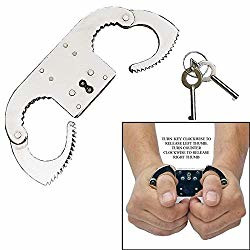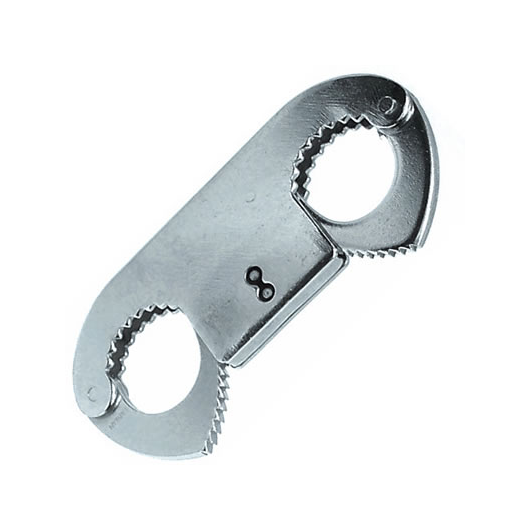Thumbcuffs
Thumb cuffs are small, easy to carry and use restraining devices. They'll fit on anyone's thumbs whether large or small and have a positive locking mechanism inside. These thumb cuffs can be locked so that they'll neither tighten nor loosen. Ideal for undercover law enforcement, security guards, private investigators, or anyone with a need for a small but tough set of thumb cuffs.

Comes with two keys. Features a double lock for preventing the thumb cuffs from over-tightening.
Features:
- 4" Overall Size
- Heavy Duty
- Light Weight & Compact
- Nickel-Plated Steel
- Includes 2 Keys
Thumbcuffs: What They Are and How They Are Used
Thumb cuffs may sound like a strange torture device to some or a fun toy to others. Just the same, it is simply a device used for restraining an individual. You can find thumb cuffs in many operations and activities performed by law enforcement officers such as policemen, detectives, soldiers, and yes, even bounty hunters. So what are Thumbcuffs really and how are they used?
Under the thumb
Thumbcuffs are used as restraining devices. They are made of metal and resemble the more common wrist cuffs or handcuffs, except that handcuffs are designed to fit around the thumbs, particularly below the knuckles. They are significantly smaller than handcuffs, obviously, but they are as effective.
They can effectively restrain the individual by keeping his hands close together in front of his body. If preferred, they can be put on with the hands behind the back for better restraint. In either position, an individual will find it difficult to run away or attempt an escape because he will be severely restricted by his uncomfortable and unfamiliar position. If a person cannot use his hands or arms for balancing his body, he will find it hard to run fast.
Because thumbcuffs are smaller, they are easier to carry and conceal. They come with a set of keys for unlocking.
Using thumb cuffs

Thumbcuffs are opened and slipped around each thumb. To prevent them from slipping, make sure that they are positioned below the knuckles. Once you close the ‘cuffs around the thumbs, the slight protrusion or angle of the knuckles will prevent them from slipping off.
Risks associated with thumbcuffs
Thumbcuffs, unlike handcuffs, require some level of cooperation from an individual to restrain them. With handcuffs, an individual can be restrained even if he tries to struggle. As long as you can put his or her hands or arms in the right position, you can easily slip the handcuffs around his wrists. With thumbcuffs, the thumbs have to be fully extended in order to be slipped snugly into the device.
Thumbcuffs are also notorious for causing injuries to the thumb. If they are not designed with a lockspring, there is a danger that the cuffs will tighten too much. If they wrap around the thumb too tightly, they could block off the circulation of the blood. If the thumbs remain in their position for several hours, the lack of circulation could lead to pain or even injury.
Today, handcuffs are preferred over thumbcuffs to minimize injury. However, you’ll probably still find thumb cuffs being used by some police forces for arresting suspects. They have also found their place as favorite recreational toys, particularly for magicians performing escape tricks.
No reviews found




